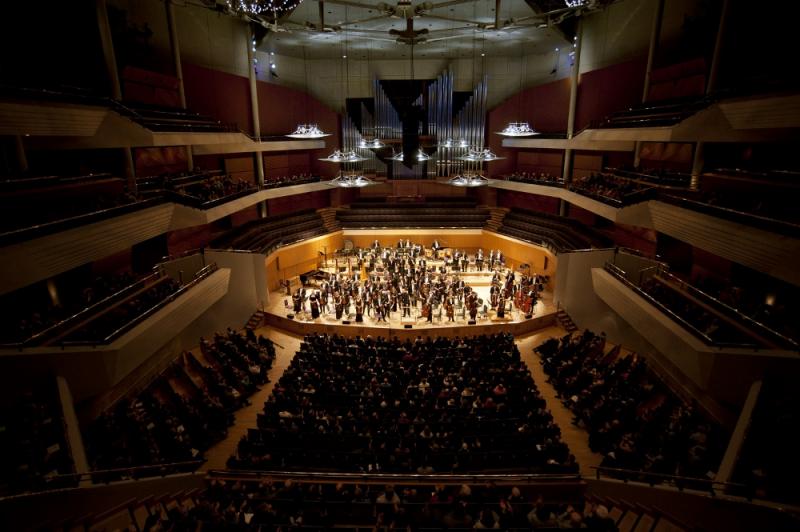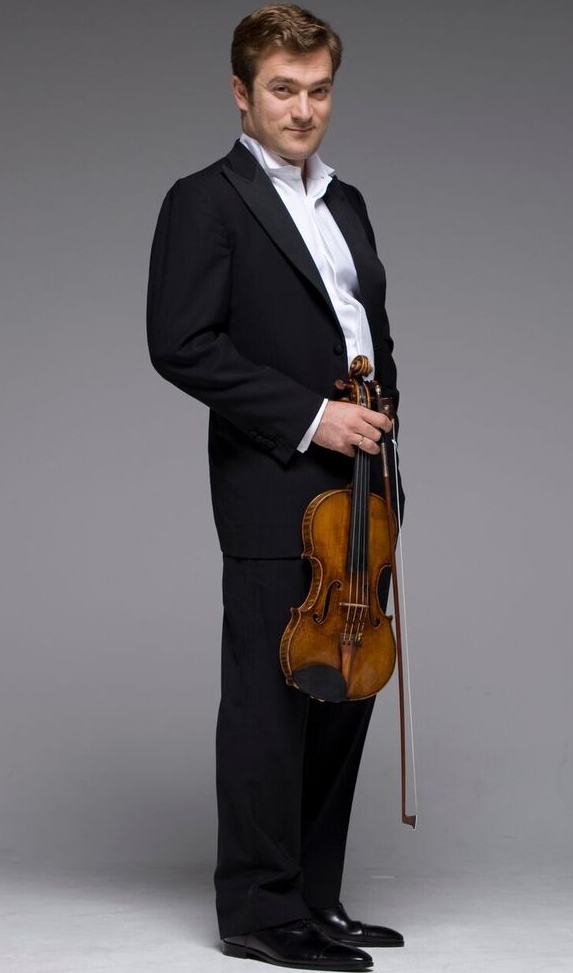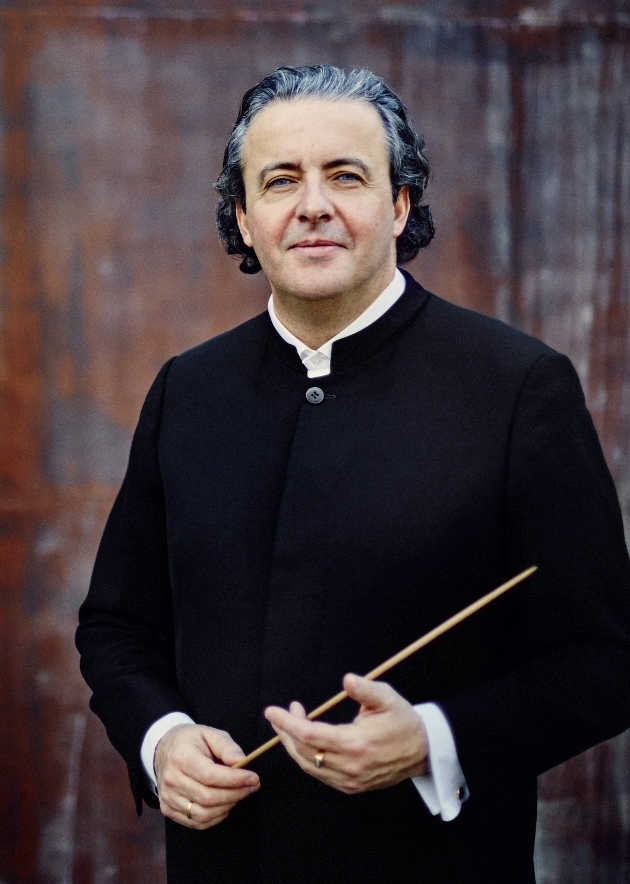Capuçon, BBCPO, Mena, Bridgewater Hall, Manchester review - awesome unity | reviews, news & interviews
Capuçon, BBCPO, Mena, Bridgewater Hall, Manchester review - awesome unity
Capuçon, BBCPO, Mena, Bridgewater Hall, Manchester review - awesome unity
A UK premiere for Shchedrin plus two Shostakovich masterpieces

Shostakovich’s First Violin Concerto is a big work in every sense: four movements, plus a solo cadenza before the last one that makes it seem almost like five; a soloist’s role that even David Oistrakh (for whom it was first written) found taxing; symphonic construction and instrumentation which make the orchestral contribution at least as important as the solo one.
In the hands of Renaud Capuçon (pictured below by François Darmigny) and the BBC Philharmonic under Juanjo Mena in Manchester it received the quality of performance it needs, and then some. Capuçon was in front of an orchestra including 60 strings, and with tuba and contrabassoon as well as the usual suspects, but they did not outshine him. Both the Scherzo and Burlesque finale require extraordinary virtuosity – and so does the cadenza – and he delivered all the fireworks. If there was one drawback in it all it was the extra percussion effect coming from his right foot on the floor in the fiercest passages: that may even be audible in the broadcast of the concert (on Thursday) and it was certainly audible in the hall.
 But the spirit was there, and he and Mena brought an awesome unity of purpose to the work, catching the pregnant passion of the opening theme for the cellos, plaintiveness in the solo wind playing, an eloquent balance of clowning and grimness in the Scherzo, and sweet and restful beauty in the third-movement Passacaglia (with wonderful playing from the Philharmonic’s two bassoons).
But the spirit was there, and he and Mena brought an awesome unity of purpose to the work, catching the pregnant passion of the opening theme for the cellos, plaintiveness in the solo wind playing, an eloquent balance of clowning and grimness in the Scherzo, and sweet and restful beauty in the third-movement Passacaglia (with wonderful playing from the Philharmonic’s two bassoons).
This was the second of four concerts by Juanjo Mena in his final season as chief conductor in the orchestra’s Bridgewater Hall series, and the only one to have an identifiably valedictory component – which came with Shostakovich’s final symphony, No 15, in the second half of the programme. But it began with a UK premiere, albeit of a work first unveiled 16 years ago.
Rodion Shchedrin’s Dialogues with Shostakovich was written for Mariss Jansons and Pittsburgh Symphony in 2001, to go alongside some of Shostakovich’s other music. It’s Shchedrin’s 85th birthday later this month (on Saturday), and this concert was one marking it in the UK. The piece calls for a large orchestra and a battery of percussion, which may account for its long wait for a UK first hearing. It’s also quite episodic (at least that was the impression), reflecting in succession a number of aspects of the music of the one Shchedrin calls "The Master", albeit through the refraction of a very individual voice.
 So there’s nothing so banal as straight quotation – but recognizable echoes including thunderous march (and mock-march) rhythms, squealing high wind trills, slow music for strings as agonizingly passionate and sorrow-laden as anything DSCH himself wrote, pathetic (in the right sense) little piccolo solos, and a lot of vigorous, open-textured counterpoint. Its twin opening crashes are repeated at the end – and then there’s a kind of echoed one … a valedictory gesture, perhaps.
So there’s nothing so banal as straight quotation – but recognizable echoes including thunderous march (and mock-march) rhythms, squealing high wind trills, slow music for strings as agonizingly passionate and sorrow-laden as anything DSCH himself wrote, pathetic (in the right sense) little piccolo solos, and a lot of vigorous, open-textured counterpoint. Its twin opening crashes are repeated at the end – and then there’s a kind of echoed one … a valedictory gesture, perhaps.
Speaking of banal straight quotation … that’s precisely what Shostakovich did in his final symphony. For starters, it’s the tu-tu-tum, tu-tu-tum etc of Rossini’s William Tell Overture he chooses to quote, and you can’t get more banal than that. Then there’s the fate motif from Wagner’s Ring (in the finale). What was he up to? Doing something he always did very well, which is to combine the ridiculous and the sublime.
Mena (pictured right by Michal Nowak) was very well aware of that, and in the opening Allegro he brought out the abrupt change of mood in mid-movement which happens despite surface appearances and underlines the fact that Shostakovich’s jollity almost always has a grim side to it. The orchestral playing in the anguished Adagio, both from principal cello Maria Zachariadou and from the brass chorus, was noble, warm and perfectly balanced, and guest leader Michael Foyle made a signal contribution in solos, too. The Phil’s wind principals and percussion ensemble were spot-on in the ironically lively Allegretto, and the finale, after moving and sensitive muted string playing, was brought to a huge climax, given suitably crucial emphasis in Mena’s pacing, before the weird and tantalizing conclusion.
rating
Share this article
Add comment
more Classical music
 Christian Pierre La Marca, Yaman Okur, St Martin-in-The-Fields review - engagingly subversive pairing falls short
A collaboration between a cellist and a breakdancer doesn't achieve lift off
Christian Pierre La Marca, Yaman Okur, St Martin-in-The-Fields review - engagingly subversive pairing falls short
A collaboration between a cellist and a breakdancer doesn't achieve lift off
 Ridout, Włoszczowska, Crawford, Lai, Posner, Wigmore Hall review - electrifying teamwork
High-voltage Mozart and Schoenberg, blended Brahms, in a fascinating programme
Ridout, Włoszczowska, Crawford, Lai, Posner, Wigmore Hall review - electrifying teamwork
High-voltage Mozart and Schoenberg, blended Brahms, in a fascinating programme
 Sabine Devieilhe, Mathieu Pordoy, Wigmore Hall review - enchantment in Mozart and Strauss
Leading French soprano shines beyond diva excess
Sabine Devieilhe, Mathieu Pordoy, Wigmore Hall review - enchantment in Mozart and Strauss
Leading French soprano shines beyond diva excess
 Špaček, BBC Philharmonic, Bihlmaier, Bridgewater Hall, Manchester review - three flavours of Vienna
Close attention, careful balancing, flowing phrasing and clear contrast
Špaček, BBC Philharmonic, Bihlmaier, Bridgewater Hall, Manchester review - three flavours of Vienna
Close attention, careful balancing, flowing phrasing and clear contrast
 Watts, BBC Symphony Orchestra and Chorus, Bignamini, Barbican review - blazing French masterpieces
Poulenc’s Gloria and Berlioz’s 'Symphonie fantastique' on fire
Watts, BBC Symphony Orchestra and Chorus, Bignamini, Barbican review - blazing French masterpieces
Poulenc’s Gloria and Berlioz’s 'Symphonie fantastique' on fire
 Bell, Perahia, ASMF Chamber Ensemble, Wigmore Hall review - joy in teamwork
A great pianist re-emerges in Schumann, but Beamish and Mendelssohn take the palm
Bell, Perahia, ASMF Chamber Ensemble, Wigmore Hall review - joy in teamwork
A great pianist re-emerges in Schumann, but Beamish and Mendelssohn take the palm
 First Persons: composers Colin Alexander and Héloïse Werner on fantasy in guided improvisation
On five new works allowing an element of freedom in the performance
First Persons: composers Colin Alexander and Héloïse Werner on fantasy in guided improvisation
On five new works allowing an element of freedom in the performance
 First Person: Leeds Lieder Festival director and pianist Joseph Middleton on a beloved organisation back from the brink
Arts Council funding restored after the blow of 2023, new paths are being forged
First Person: Leeds Lieder Festival director and pianist Joseph Middleton on a beloved organisation back from the brink
Arts Council funding restored after the blow of 2023, new paths are being forged
 Classical CDs: Nymphs, magots and buckgoats
Epic symphonies, popular music from 17th century London and an engrossing tribute to a great Spanish pianist
Classical CDs: Nymphs, magots and buckgoats
Epic symphonies, popular music from 17th century London and an engrossing tribute to a great Spanish pianist
 Sheku Kanneh-Mason, Philharmonia Chorus, RPO, Petrenko, RFH review - poetic cello, blazing chorus
Atmospheric Elgar and Weinberg, but Rachmaninov's 'The Bells' takes the palm
Sheku Kanneh-Mason, Philharmonia Chorus, RPO, Petrenko, RFH review - poetic cello, blazing chorus
Atmospheric Elgar and Weinberg, but Rachmaninov's 'The Bells' takes the palm
 Daphnis et Chloé, Tenebrae, LSO, Pappano, Barbican review - lighting up Ravel’s ‘choreographic symphony’
All details outstanding in the lavish canvas of a giant masterpiece
Daphnis et Chloé, Tenebrae, LSO, Pappano, Barbican review - lighting up Ravel’s ‘choreographic symphony’
All details outstanding in the lavish canvas of a giant masterpiece
 Goldscheider, Spence, Britten Sinfonia, Milton Court review - heroic evening songs and a jolly horn ramble
Direct, cheerful new concerto by Huw Watkins, but the programme didn’t quite cohere
Goldscheider, Spence, Britten Sinfonia, Milton Court review - heroic evening songs and a jolly horn ramble
Direct, cheerful new concerto by Huw Watkins, but the programme didn’t quite cohere

Comments
Excellent review; the concert
The leader was Zoe Beyers.